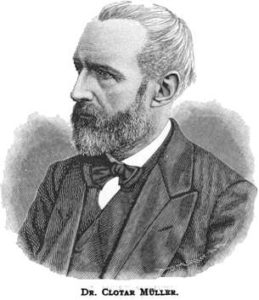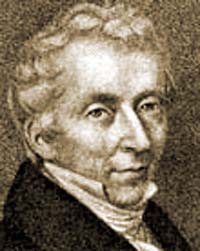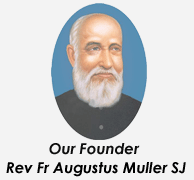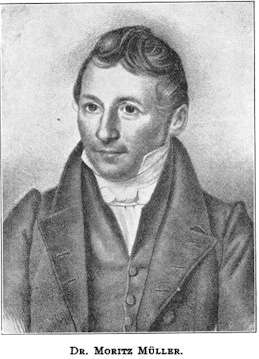 Clotar Moritz Mueller (Müller/Muller) (25 August 1818 – 10 N0vember 1877) was the son of Moritz Wilhelm Mueller. He was an early advocate of homeopathy, and an editor of the German homeopathic periodical, Homöopathische Vierteljahrschrift.
Clotar Moritz Mueller (Müller/Muller) (25 August 1818 – 10 N0vember 1877) was the son of Moritz Wilhelm Mueller. He was an early advocate of homeopathy, and an editor of the German homeopathic periodical, Homöopathische Vierteljahrschrift.
Clotar Müller submitted case histories to The British Journal of Homoeopathy in 1854, and many more papers and articles on homeopathy.
Clotar Müller was active in proving remedies and his writings were influential in the spread of homeopathy.
Clotar Müller helped Frantz Hartmann run the dispensary clinic at the homeopathic Leipsig hospital and was present at the 1877 World Homeopathic Convention:
Volume II, The History of Homeopathy, contains contributions both foreign and domestic. Appropriately enough, the first section is a 90 page history of homeopathy in Germany 1794-1875, including statistics about certain hospitals and dispensaries, written by Carl Gustav Puhlmann and Clotar Mueller.
Select Publications:
- Die Quellen der Arzneimittellehre (1860)
- Der Homöopathische Haus- und Familienarzt (1864)
- Kortfattet Homøopathisk Laegemiddellaere (1879)
- Charakteristik von Dreissig der Wichtigsten Homöopathischen Heilmittel Behufs Ihrer Anwendung in Erkrankungsfällen (1880)
Of Interest:
Th e Mueller (Müller/Muller) surname was instrumental in supporting Samuel Hahnemann in the early days of homeopathy, and the Mueller name is intrinsically connected to the success of the establishment of homeopathy Worldwide.
e Mueller (Müller/Muller) surname was instrumental in supporting Samuel Hahnemann in the early days of homeopathy, and the Mueller name is intrinsically connected to the success of the establishment of homeopathy Worldwide.
 Josef Mueller (1773 – 1852) influenced Joseph Attomyr to become a homeopath when they met in the Curassier Regiment of Russian Tsar Alexander I. Joseph Attomyr became a student of Josef Muller in Budapest after their military service.
Josef Mueller (1773 – 1852) influenced Joseph Attomyr to become a homeopath when they met in the Curassier Regiment of Russian Tsar Alexander I. Joseph Attomyr became a student of Josef Muller in Budapest after their military service.
 Adam Heinrich Muller (1779 – 1829) was an influential theologian who was part of Emperor Francis I of Austria‘s entourage. Adam Heinrich Muller was an enthusiastic advocate of homeopathy, and he did much to publicise it widely.
Adam Heinrich Muller (1779 – 1829) was an influential theologian who was part of Emperor Francis I of Austria‘s entourage. Adam Heinrich Muller was an enthusiastic advocate of homeopathy, and he did much to publicise it widely.
 Augustus Muller (1784 – 1849) was a German Jesuit priest, the grandson of Johann Augustine Muller, who was a teacher of Samuel Hahnemann. Augustus Muller was also a trained homeopath, having studied the subject under two of the most eminent doctors in Paris, and he was the founder of the Fr. Muller Medical College in Mangalore, India. Pope Pius IX postumously bestowed upon him the Apolistic Benediction in 1905
Augustus Muller (1784 – 1849) was a German Jesuit priest, the grandson of Johann Augustine Muller, who was a teacher of Samuel Hahnemann. Augustus Muller was also a trained homeopath, having studied the subject under two of the most eminent doctors in Paris, and he was the founder of the Fr. Muller Medical College in Mangalore, India. Pope Pius IX postumously bestowed upon him the Apolistic Benediction in 1905
 Moritz Wilhelm Mueller (1784 – 1849) was the father of Clotar Moriz Mueller. Moritz Wilhem Mueller was active in the Homeopathic Society in 1832 and became a director of the Leipsig Society in 1833, and he treated the famous publisher Carl Heinrich Reclam 1776 – 1844, thus even more books on homeopathy were published. The writings of Moritz Wilhelm Mueller and others spread homeopathy across Europe and beyond.
Moritz Wilhelm Mueller (1784 – 1849) was the father of Clotar Moriz Mueller. Moritz Wilhem Mueller was active in the Homeopathic Society in 1832 and became a director of the Leipsig Society in 1833, and he treated the famous publisher Carl Heinrich Reclam 1776 – 1844, thus even more books on homeopathy were published. The writings of Moritz Wilhelm Mueller and others spread homeopathy across Europe and beyond.
 Gustav Adolph Mueller (1863 – 1913) was born November 10, 1863, in Cresline, Ohio and studied medicine at Hahnemann Medical College of Chicago, receiving his M.D. from that institution in 1885. He was connected with the staff of the Pittsburgh Homeopathic Hospital, and was a member of the American Institute of Homeopathy, the Homeopathic Medical Society of the State of Pennsylvania and the Allegheny County Homeopathic Medical Society.
Gustav Adolph Mueller (1863 – 1913) was born November 10, 1863, in Cresline, Ohio and studied medicine at Hahnemann Medical College of Chicago, receiving his M.D. from that institution in 1885. He was connected with the staff of the Pittsburgh Homeopathic Hospital, and was a member of the American Institute of Homeopathy, the Homeopathic Medical Society of the State of Pennsylvania and the Allegheny County Homeopathic Medical Society.
 Carl Müller (c. 1868 – 1932) was an homeopathic pharmacist and a director of the Homöopathische Central Apotheke (est c.1865) in Göppingen, Germany. He was a proponent of Carl Friedrich Zimpel‘s spagyric homeopathy. In 1921 Müller founded his own Chemisch Pharmazeutische Fabrik company, renamed in 1956 as Staufen-Pharma Göppingen, producing homeopathic (and spagyric) simplexes and complexes.
Carl Müller (c. 1868 – 1932) was an homeopathic pharmacist and a director of the Homöopathische Central Apotheke (est c.1865) in Göppingen, Germany. He was a proponent of Carl Friedrich Zimpel‘s spagyric homeopathy. In 1921 Müller founded his own Chemisch Pharmazeutische Fabrik company, renamed in 1956 as Staufen-Pharma Göppingen, producing homeopathic (and spagyric) simplexes and complexes.
 Hugbald Volker Muller (1921 – 2000) discovered the significance of colour preferences. He worked from 1985 in order to adapt and perfect the idea of colour correspondence for homeopathic art and science.
Hugbald Volker Muller (1921 – 2000) discovered the significance of colour preferences. He worked from 1985 in order to adapt and perfect the idea of colour correspondence for homeopathic art and science.


Leave A Comment